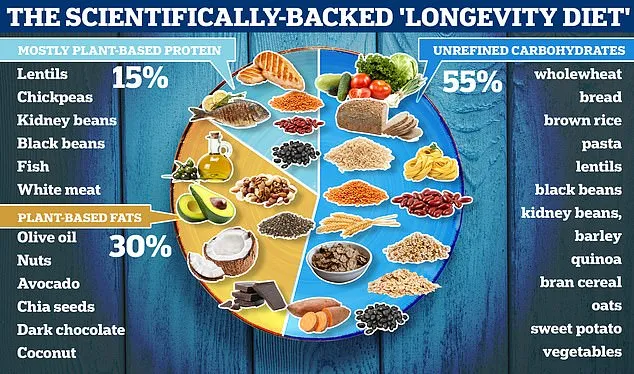ISLAMABAD, July 26(ABC): In around 440 B.C., the Greek physician Hippocrates said “Let food be thy medicine and let thy medicine be food.”
Although treating food as medicine is a highly debated concept, many recent studies have demonstrated the wisdom in this statement and how monitoring food quantityTrusted Source, type, and timing are crucial for good health.
However, what precisely makes up the optimal diet remains controversial. Growing evidence suggests optimal diets may depend on an interplay of health factors, including age, sex, and genetics.
Recently, researchers reviewed hundreds of nutrition studies from cellular to epidemiological perspectives to identify a “common denominator nutrition pattern” for healthy longevity.
They found that diets including mid-to-high levels of unrefined carbohydrates, a low but sufficient plant-based protein intake, and regular fish consumption were linked to an extended lifespan and healthspan.
Dr. Valter Longo, professor of gerontology and biological sciences at the University of Southern California, and one of the authors of the study, told Medical News Today:
“First, diet here is intended as a nutritional lifestyle and not as a ‘weight-loss strategy’ although maintaining a healthy weight is key. All aspects of the diet are linked to long-term health and longevity.”
“I am delighted to see this review,” Dr. Pankaj Kapah, professor of gerontology at the University of Southern California, who was not involved in the study, told MNT.
“Generally when one thinks of a longevity diet, the first thing that comes to mind is what we can add to our diet to live longer. This article is important to raise the awareness that the most striking benefits from studies across species have come from limiting the diet or fasting.”
— Dr. Pankaj Kapah
The review was published in the journal CellTrusted Source.
The foundation of the longevity diet
For the study, the researchers analyzed hundreds of studies examining nutrition and delayed aging in short-lived species, nutrient response pathways, caloric restriction, fasting, and diets with various macronutrient and composition levels, such as the keto diet.
The studies analyzed nutrition and diet from multiple angles, from cellular and animal studies to clinical and epidemiological research investigating the lifestyles of centenarians.
In the end, the researchers found that the ‘longevity diet’ includes:
- A legume and whole grain-rich pescatarian or vegetarian diet
- 30% of calories from vegetable fats such as nuts and olive oil
- A low but sufficient protein diet until age 65 and then moderate protein intake
- Low sugar and refined carbs
- No red or processed meat
- Limited white meat
- 12 hours of eating and 12 of fasting per day
- Around three cycles of a five-day fasting-mimicking diet per year
The researchers further noted that, rather than targeting a certain number of calories, diets should aim to keep BMI under 25 and maintain ideal sex and age-specific body fat and lean body mass levels.
Moreover, they wrote that diets should be adapted to individual needs—especially for those over 65—to avoid malnourishment. Those over 65, for example, may become frail from a low protein diet.
For those without insulin resistance or obesity, high consumption of complex carbohydrates could reduce frailty in this age group and others, the researchers wrote, as it provides energy without increasing insulin and activating glucose signaling pathways.
The researchers also found that periodic fasting between the ages of 18 and 70 could reverse insulin resistance generated by a high calorie diet and regulate blood pressure, total cholesterol, and inflammation.
A recent study supports these findings. It found that changing from the typical Western diet to one rich in legumes, whole grains, and nuts with reduced red and processed meats is linked to an 8-year-longer life expectancy if started at age 60.
Underlying mechanisms
The researchers noted that diets involving calorie and protein restriction were consistently beneficial, whether in short-lived species or om epidemiological studies and large clinical trials.
They further noted that low but sufficient protein, or a recommended protein intake with high levels of legume consumption, could increase the health span by reducing the intake of amino acids including methionine. Methionine has been linked to increased activity in various pro-aging cellular pathways.
When asked how the longevity diet may benefit health from a clinical perspective, Kristin Kirkpatrick, a registered dietitian nutritionist at the Cleveland Clinic and advisor to Dr. Longo’s firm, Prolon, told MNT:
“The diet is primarily plant-based which, based on other similar studies, may contribute to lower risk of chronic conditions such as type 2 diabetes and cardiovascular disease.”
“Plant-based diets have also been associated with lower inflammation levels in multiple studies. As inflammation is the base of many diseases, this may contribute to the longevity factors as well,” she explained.
The researchers conclude that their findings provide solid foundations for future research into nutritional recommendations for healthy longevity.
When asked about the study’s limitations, Dr. Longo, Dr. Kapahi, and Kirkpatrick stressed that there is no ‘one-size-fits-all’ approach. The optimal diet, they say, may differ due to factors including sex, age, genetic makeup, and any sensitivities and intolerances, such as an intolerance to gluten.
Dr. Longo thus recommends people visit a dietician before undertaking a new diet.
Kirkpatrick added that many of her patients visit her when making dietary changes to ensure they are sustainable in the long term.

